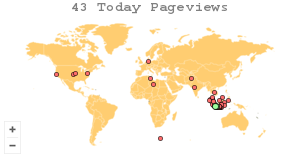Landasan Teologis Tafsir Ekologis Dalam Kitab Tafsir Nusantara
(Kajian Terhadap Wacana Pemikiran Tafsir kontemporer)
DOI:
https://doi.org/10.47498/bashair.v5i1.4655Keywords:
Theological Foundation,, cological Interpretation,, Nusantara InterpretationAbstract
Contemporary Qur’anic exegesis examines current social phenomena, using issues like poverty, gender, and especially the environment as the basis for interpretation. This article focuses on environmental issues, highlighting growing public concern over environmental damage caused by both natural events and human actions. Such concerns have led exegetes to explore Qur’anic verses on environmental preservation, emphasizing that protecting the environment is a religious command. Three major Nusantara tafsir—Tafsir al-Azhar (HAMKA), Tafsir al-Misbah (Quraish Shihab), and Tafsir Kemenag—discuss this theme in depth. Using a descriptive qualitative method, this study finds that verses such as QS Al-Baqarah: 30, QS Al-Isra’: 27, QS Al-A’raf: 56, QS Al-Anbiya: 30, QS Ar-Rum: 41, QS Ali Imran: 190–191, and QS Ibrahim: 7 form the basis for environmental preservation in these interpretations.
References
Amin, M. (2013). Kontribusi Tafsir Kontemporer Dalam Menjawab Persoalan UMMAT. jurnal Substantia, 15(1), 3.
Aziz, A., & Sofarwati, D. (2021). Kajian Tafsir al-Misbah Karya Muhammad Quraish Shihab. jurnal Pendidikan Islam, 3(1), 11.
Djazali, S. (2014). Islamic Consept About Environemantal Conservation. jurnal Bimas Islam, 7(11), 355.
Ggufran, A., & Sabaruddin. (2007, Februari). Islam dan Konservasi Lingkungan (Telaah Pemikiran Fikih Lingkungan Yusuf al-Qaradhawi). jurnal Millah, VI(2), 61-63.
Herlina, N. (2015). Permasalahan lingkungan Hidup dan Penegakan hukum lingkungan di Indonesia. jurnal Ilmiah: Galuh Justisi, 3(2), 3.
Hidayati, H. (2018, januari-Juni ). Metodologi Tafsir Kontekstual Al-Azhar Karya Buya HAMKA. el-umdah: Jurnal Ilmu Alquran dan tafsir, 1(1), 32.
Khalid, F. (2017). Exploring Enviromental Ethics in islam: Insights From The Quran and The Practice of Profet Muhammad. In J. hart (Ed.), Religion and Ecology. John Willey & Sons Ltd.
Lajnah, & Alquran, P. M. (2009). Tafsir Al-Quran Tematik: Pelestarian Lingkungan Hidup. Jakarta: Badan Litbang dan Diklat Departeman Agama RI.
Latifa, I., & Idris. (2024). Tafsir Ayat-Ayat Ekologi Yusuf Al-Qaradhawi dan Seyyed Hossein Nasr. jurnal al-Thiqah: Jurnal Ilmu keIslaman, 7(1), 160.
Malik, A. (2022, Januari). Lingkungan Hidup dan Pengelolaan Sumber daya Alam Dalam perpektif Islam. Lingkungan Almuslim, 1(1), 31.
Munawarah, T. W. (2020). Tafsir Ekologis Al-Quran Surah al-mukminun Ayat 18. jurnal Syams: Jurnal Studi KeIslaman, 1(2), 69.
Najitama, F., & Chotimah, C. (2016, juli-Desember). Islam dan Krisis Lingkungan Hidup ( Rekontruksi Paradigma Menuju Islam Ramah lingkungan). jurnal An-Nidzam, 3(2), 128.
Nurrahmi, A., Safrudin, I., Ridwan, A. H., & Sohifah, S. (2023, Juli-Desember). Keseimbangan Ekologis Dalam Perspektif Islam: Studi Komperatif Tafsir al_Misbah dan tafsir al-Azhar. tafsir Islamica: Jurnal Ilmu-Ilmu Agama islam, 7(2), 37.
Putro, H., Rosadi, D. I., Pebriananta, R., & Rajib, R. K. (2023). Melangkah menuju lingkungan yang berkelanjutan: Tantangan dan solusi untuk masa depan bumi. jurnal Multidisiplin Ilmu Akademik, 1(3), 116.
Rodin, D. (2017). Alquran dan Konservasi Lingkungan: Telaah Ayat-Ayat Ekologis. jurnal Al-Tahrir, 17(2), 393.
Rusdiyanto. (2015, Desember). masalah lingkungan hidup Indoneisa menghadapi era glabalisai dalam jurnal Cakrawala Hukum. jurnal Cakrawala Hukum, 6(2), 218.
Saddad, A. (2017). Paradigma Tafsir Ekologis. jurnal Kontemplasi, 5(1), 71.
Sriyanto. (2007). Kondisi Lingkungan Hidup di Jawa Tengah dan Prospek Pembangunan ke depan. jurnal geografi, 4(2), 110.
Sudianto, A. (2022, April). Metode Tafsir Kontemporer. Jurnal Literatus: Literature for social impact and cultural studies, 4(1), 252.
Zulaikha, S. (2014). Pelestarian Lingkungan Hidup Perpektif Hukum islam dan undang-undang. AKADEMIKA, Jurnal Pemikiran Islam, 19(2), 243.
Downloads
Published
Issue
Section
License
Authors who publish articles in Basha'ir: Jurnal Studi Al-Qur'an & Tafsir agree to the following conditions:
- The author retains copyright and grants the Basha'ir Journal the right from the first publication with the work simultaneously licensed under a Creative Commons Attribution-ShareAlike 4.0 International (CC BY-SA 4.0) license that allows others to make changes, adjust and build on the work with recognition of the author's work and initial publication in the Journal.
- Authors are allowed to copy and redistribute published versions of works in journals (for example, posting them to institutional repositories or publishing them in a book), with recognition of their initial publication in Basha'ir: Jurnal Studi Al-Qur'an & Tafsir.
- Authors are allowed and encouraged to post their work online (for example, in institutional repositories or on their websites) before and during the submission process, as it can lead to productive exchanges, and increase citations of published works





